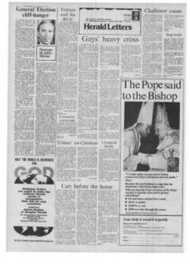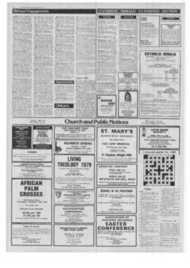Page 1, 30th March 1979
Page 1

Report an error
Noticed an error on this page?If you've noticed an error in this article please click here to report it.
Tags
Share
Related articles
Watershed In Our History Of Faith
In Brief
Time For The Vatican To Rethink According To Mainz Prelate
A Staff 'reporter Looks Back On A —
7ncyclical — A Magna For Mankind
John Paul I might have lifted ban on pill
by a correspondent
Pope John Paul I might well have lifted the Church's ban on artificial birth control if he had lived longer. lie would have taken another look at the controversial encyclical Humanae Vitae, produced by Pope Paul VI in 1968, to try and find a suitable way round its teaching on contraception.
That is the view of Fr Mario Senigaglia, the Pope's former secretary in Venice. Fr Senigaglia said that Pope John Paul would have re-studied the encyclical not to condemn it, because that wasn't his style, but to find a possible way out. He always looked for the encyclical's mitigating clauses and he was very aware of the pastoral difficulties," he said. The priest also commented on a letter about birth control sent to Pope Paul by the Triveneto bishops' conference in 1967 — the year before Humanae Vitae was published. He said that the letter had been drafted by the then Bishop Luciani and added: "It was a very frank and open document. Certainly the bishops would have discussed it and they might have modifed it slightly but essentially it was Luciani's document."
At that time Fr Senigaglia was secretary to Cardinal Giovanni Urbani of Venice. He said that the Cardinal had visited the Pope during the summer of 1967 and "after the audience he said that Pope Paul had Luciani's document on his desk and expressed great interest in it. Cardinal Urbani said that Pope Paul seemed oriented in the direction of the document — which certainly was not the direction of Humanae Vitae.", Er Senigaglia's evidence was unearthed by Kay Withers, a Rome-based journalist currently researching a biography of the "smiling Pope" who reigned for only 33 days.
Ms Withers said that she had also found other signs that Pope John Paul had disagreed with the ban on contraception. They included a letter sent to his priests in 1968 while he was bishop of Vittorio Veneto.
In the letter he said: "1 confess that — even if I did not let it leak out in \' riling -I had hoped in
my heart that the very grave existing difficulties could have been overcome and that the answer of the teacher, who speaks with special charisma and in the name of the Lord, could have coincided. at least in part, with the hopes engendered among many couples after a special pontifical commission was formed to study the question."
The commission recommended easing the restrictions on artificial contraception, Ms Withers also drew attention to an interview given by the then Cardinal Luciani to the Venice newspaper 11 Gaziettino, in February 1974 in which he said that Catholics were obliged to accept the teaching out of humility, prudence and the religious obdience owed to the head of the Church."
I lowever, he then added: "If I were the divine master of the law' I would abolish the law."
Another leading Church figure interviewed by Ms Withers was the retired Bishop Gioacchino Muccin of Belluno. the diocese in which Albino Luciani grew up. He told her that a doctor once suggested to the future Pope that the birth control pill might be considered a "medicine" to regulate "excess.% e" ovulation the way that an antihistamine would be used to curb excess discharges in the respiratory tract.
Bishop Muccin said that Bishop Luciani seeined quite interested in whether that kind of approach might solve the Church's dilemma. However, Ms Withers said that Luciani's writings showed that he recognised the anguish and sense of duty with which Pope Paul issued the encyclical.
She cited his letter to priests after the encyclical which said about Pope Paul: "He knows that he will be a cause for bitterness in many; he knows that a different solution would probably have brought him more human applause; but he places his trust in God and in order to he faithful to God's Word, reproposes the constant traditional teaching on this very delicate matter in all its purity.
'Recent scientific discoveries? The social evolution of our epoch? The growing need for 'responsible parenthood'? The necessity of harmonising this 'responsible parenthood' with the demands of conjugal love? All these things are kept in mind but they do not solicit a new doctrine."
blog comments powered by Disqus











